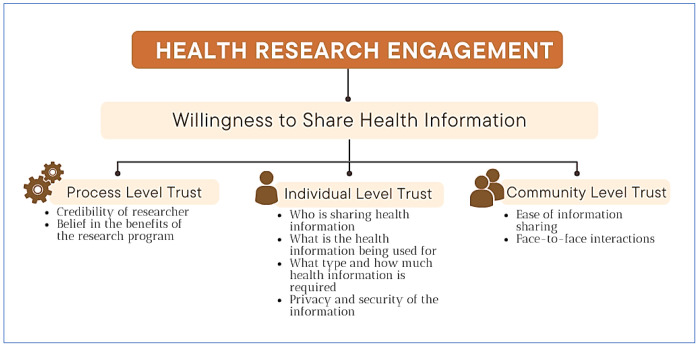Color coded health data: factors related to willingness to share health information in South Asian community members in Canada.
IF 1.6
Q3 HEALTH CARE SCIENCES & SERVICES
引用次数: 0
Abstract
Abstract Introduction Data unavailability poses multiple challenges in many health fields, especially within ethnic subgroups in Canada, who may be hesitant to share their health data with researchers. Since health information availability is controlled by the participant, it is important to understand the willingness to share health information by an ethnic population to increase data availability within ethnocultural communities. Methods We employed a qualitative descriptive approach to better understand willingness to share health information by South Asian participants and operated through a lens that considered the cultural and sociodemographic aspect of ethnocultural communities. A total of 22 in-depth interviews were conducted between March and July 2020. Results The results of this study show that health researchers should aim to develop a mutually beneficial information-sharing partnership with communities, with an emphasis on the ethnocultural and socio-ecological aspects of health within populations. Conclusion The findings support the need for culturally sensitive and respectful engagement with the community, ethically sound research practices that make participants feel comfortable in sharing their information, and an easy sharing process to share health information feasibly.

颜色编码的健康数据:与加拿大南亚社区成员分享健康信息的意愿相关的因素。
数据不可得性在许多卫生领域构成多重挑战,特别是在加拿大的族裔亚群体中,他们可能不愿与研究人员分享他们的卫生数据。由于健康信息的可得性由参与者控制,因此了解族裔人口分享健康信息的意愿以增加族裔文化社区内的数据可得性是很重要的。方法:我们采用定性描述方法来更好地了解南亚参与者分享健康信息的意愿,并通过考虑民族文化社区的文化和社会人口学方面的视角进行操作。在2020年3月至7月期间,共进行了22次深度访谈。结果:本研究结果表明,卫生研究人员应致力于与社区建立互利的信息共享伙伴关系,重点关注人口健康的民族文化和社会生态方面。结论:研究结果支持了与社区进行具有文化敏感性和尊重性的接触的必要性,支持了伦理上合理的研究实践,使参与者在分享信息时感到舒适,支持了一个简单的分享过程,以可行地分享健康信息。
本文章由计算机程序翻译,如有差异,请以英文原文为准。
求助全文
约1分钟内获得全文
求助全文
来源期刊

International Journal of Population Data Science
Social Sciences-Demography
CiteScore
2.50
自引率
0.00%
发文量
386
审稿时长
20 weeks
 求助内容:
求助内容: 应助结果提醒方式:
应助结果提醒方式:


